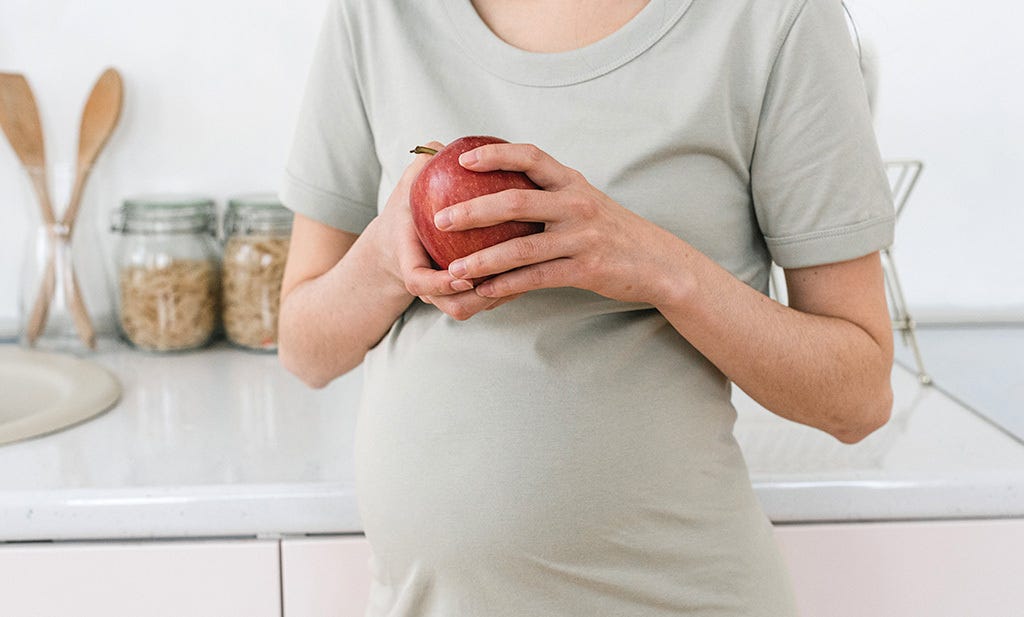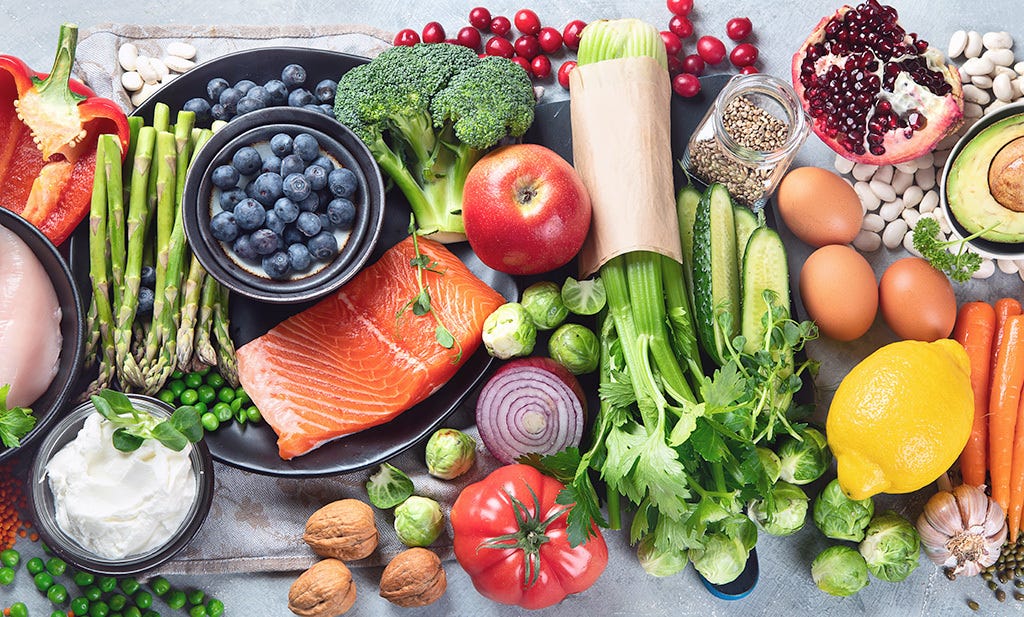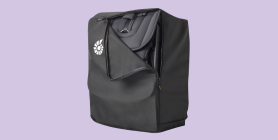
As soon as you see that positive pregnancy test your mind starts racing! And soon the questions about food and drink start coming: "Can I still drink my beloved cup (cups!) of coffee in the morning?" "Does my fried egg really need to be cooked all the way through?" "Oh no, I'd better cancel dinner with my friends at the sushi restaurant on Wednesday..." In short, most pregnant people worry about the following from the early days: What can’t I eat and drink during pregnancy? And even if you think you roughly know the rules - no alcohol, no caffeine, no raw fish, no raw meat - doubts suddenly arise again at the moment of purchase or consumption. Isn't mozzarella also raw milk cheese? Can I eat salami or not? And what about parmesan?
It is precisely this uncertainty that we want to take away from you here and now. And we’ve created a handy document on "What not to eat and drink during pregnancy" (pdf), with all the details you need. You can carry this list with you and easily check whether what you are holding in your hands is right for you and your baby. It of course doesn’t replace a nutritional consultation with your midwife or a nutritionist however!
What should you not eat or drink during pregnancy? The taboos
Basically, you are probably all aware that it is important to eat a healthy and balanced diet and drink enough fluids (1.5 - 2 litres/day) during pregnancy. Ideally, also to prevent nausea, you should concentrate on five to six meals a day. And these should contain plenty of fruit and vegetables, as well as fish, meat, and dairy products. Carbohydrates such as rice, pasta, and potatoes should make up just over a 3rd of the food you eat, choose wholegrain options where possible.
However, there are a few rules to follow here. This is because the condition, method of production, preparation, and storage of some of these products is crucial. You can therefore start by remembering to avoid the following during pregnancy (please use a table):
- Unpasteurised milk
- Undercooked, raw or smoked fish and seafood
- Offal
- Soft serve ice cream
- or produced under the Laid in Britain scheme
- Dishes made from raw eggs (e.g. tiramisu or mayonnaise) that are not British Lion or produced under the Laid in Britain scheme
- Unwashed salads and salads from buffets
- Energy drinks
- Liquorice root (liquorice is fine)
- Some types of fish including shark, swordfish and marlin
You should also limit your intake of the following foods and drinks:
- - approx. 2 cups of filter coffee, note: regular caffeine consumption can reduce the child's birth weight)
- Foods that are high in fat, sugar or both in moderation
- You should avoid having more than 2 portions of oily fish a week, such as salmon, trout, mackerel and herring

What should you not eat or drink during pregnancy? The background
It is recommended that you avoid these foods during pregnancy to prevent infections with listeria, toxoplasmosis and salmonella. In addition, some foods contain ingredients that could harm your baby. Here we list the most common infections caused by food and drink, as well as food ingredients that you should avoid:
Listeriosis
This disease is caused by small bacteria called listeria, which can be found in raw milk products, for example. Although harmless, they can cause severe cold and flu symptoms in pregnant women due to the altered immune system and can lead to premature births or miscarriages. The following foods may contain listeria:
- Raw sprouts
- Smoked and cured fish – including in sushi
- Cooked shellfish
- Soft mould-ripened cheeses (such as camembert and brie) and blue-veined cheeses
- Pâté
- Pre-prepared sandwiches and salads
- Pre-cut fruit (such as pre-packed melon slices)
- Unpasteurised milk
- Dairy products made from unpasteurised milk
- Leftover food so ensure to heat these thoroughly
Toxoplasmosis
This infection is caused by specific parasites. Once infected, you are often immune to toxoplasmosis (please have your titre determined). If you become infected with toxoplasmosis for the first time during pregnancy, this can lead to severe brain damage in the unborn child or even to a miscarriage. You can have a test done by your gynaecologist or midwife to find out whether you are immune or seek advice. Otherwise you should avoid:
- Raw meat and sausages
- Unwashed fruit and vegetables
- Also be careful when cleaning a cat’s litter tray if you have one and when gardening - avoid these activities if possible or wear disposable rubber gloves and wash your hands thoroughly
Salmonella
Salmonella is probably familiar to most of you. It causes severe diarrhoea and severe vomiting as well as fever and chills. Salmonella is unlikely to harm your unborn baby, but you could get food poisoning. Salmonella is mainly found in the following foods:
- Raw and soft-boiled or soft-fried eggs as well as eggs that have been damaged during transport. British Lion hen eggs and hen eggs produced under the Laid in Britain scheme are less likely to have salmonella in them.
- Raw meat
- Raw sprouts
Mercury
Even though fish is rich in omega-3 fatty acids and these are essential for the healthy development of a child's brain, nerve cells and the retina of the eye, caution is advised. This is because fish can be contaminated with mercury or harmful substances. Larger predatory fish are particularly affected, for example:
- Tuna
- Swordfish
- Shark
- Marlin
You should limit oily fish to no more than 2 potions a week because they can have pollutants such as dioxins and polychlorinated biphenyls in them. If you eat too much of these, they can be harmful to your unborn baby. Oily fish examples:
- Salmon
- Trout
- Mackerel
- Herring
Tuna does not count as an oily fish. You can have 2 tuna steaks, or 4 medium-size cans of fish, as well as 2 portions of oily fish a week.
Vitamin A
Vitamins and vitamin A are generally healthy. However, too much vitamin A can harm your child. You should therefore avoid eating liver. You also avoid any high-dose multivitamin supplements, or any supplements with vitamin A in them.
Caffeine
Large amounts of caffeine not only accelerate the mother's heartbeat, but also that of the unborn baby. However, doctors say you can have caffeine, but no more than 200mg per day. Regularly drinking more than this can increase your risk of pregnancy complications, such as low birthweight and even miscarriage. This is roughly equivalent to two cups of coffee. But be careful! Caffeine is also found in many other foods such as tea, cocoa, cola, chocolate and, of course, energy drinks. You should avoid the latter as they far exceed the specified guideline value and contain substances such as taurine and inositol. Their effects on children's brain metabolism have not yet been sufficiently researched.
10 tips for avoiding risks
Phew, that's quite a lot to consider, isn't it? And if you then look at the more detailed list, you might rightly ask yourself: What are pregnant women even allowed to eat? Don't worry, there's still plenty left. What's more, you can easily minimise one or two sources of danger yourself by preparing your food fresh and cooking everything thoroughly. You should also pay attention to hygiene in the kitchen. In general, but also when preparing and storing food. Here are ten more tips for safe eating during pregnancy:
- Do not eat anything that has passed its best-before date.
- Place leftover food immediately in a container provided for this purpose in the refrigerator and store for a maximum of two days. Then heat to at least 60 degrees.
- Milk:
.Avoid unpasteurised cows' milk, goats' milk, sheep's milk or cream. - Cheese: You can eat:
- pasteurised or unpasteurised hard cheeses, such as cheddar, gruyere and parmesan
- pasteurised semi-hard cheeses, such as edam and stilton
- pasteurised soft cheeses, such as cottage cheese, mozzarella, feta, cream cheese, paneer, ricotta, halloumi, goats' cheese without a white coating on the outside (rind)
- processed cheese spreads and soft or blue cheese (pasteurised or unpasteurised) that has been cooked until steaming hot
- pasteurised milk, yoghurt, cream and ice cream
Avoid:
- any foods made from unpasteurised milk, such as soft ripened goats' cheese
- pasteurised or unpasteurised mould-ripened soft cheeses with a white coating on the outside, such as brie, camembert and chèvre (unless cooked until steaming hot
- pasteurised or unpasteurised soft blue cheeses, such as danish blue, gorgonzola and roquefort (unless cooked until steaming hot.
- Eggs:
You can eat:
- raw, partially cooked and fully cooked British Lion hen eggs (they have a lion stamp on them) and hen eggs produced under the Laid in Britain scheme
- foods made with raw hen egg, such as mousse and mayonnaise, if made with British Lion eggs or hen eggs produced under the Laid in Britain scheme
- well cooked eggs (white and yolk) from any hen eggs that are not British Lion eggs or produced under the Laid in Britain scheme
- well cooked eggs (white and yolk) of all other eggs, including duck, goose or quail
Avoid:
- raw or partially cooked hen eggs that are not British Lion or produced under the Laid in Britain scheme
- raw or partially cooked duck, goose or quail eggs
- Meat:
What you can eat
- meats such as chicken, pork and beef, as long as they're well-cooked with no trace of pink or blood; be especially careful with poultry, pork, sausages and burgers
- cold, pre-packed meats such as ham and corned beef
What to be careful with
- cold cured meats, such as salami, pepperoni, chorizo and prosciutto (unless cooked thoroughly)
What to avoid
- raw or undercooked meat
- liver and liver products
- all types of pâté including vegetarian pâté
- game meats such as goose, partridge or pheasant
- Hygiene: Use your own chopping board and knife when preparing raw meat. Wash all surfaces and your hands thoroughly after preparation and use gloves.
- Fish
What you can eat
- cooked fish and seafood
- sushi, as long as the fish has been cooked thoroughly
- cooked shellfish, such as mussels, lobster, crab, prawns, scallops and clams
What to limit
- you should eat no more than 2 portions of oily fish a week, such as salmon, trout, mackerel or herring
- you should eat no more than 2 tuna steaks (about 140g cooked or 170g raw) or 4 medium-size cans of tuna (about 140g when drained) per week
Tuna does not count as an oily fish. You can have 2 tuna steaks, or 4 medium-size cans of fish, as well as 2 portions of oily fish a week.
What to avoid
- swordfish
- marlin
- shark
- raw shellfish
- cold-smoked or cured fish (for example smoked salmon or gravlax, including in sushi), unless it has been cooked until steaming hot. If you can't and don't want to do without sushi, you should prepare it yourself and use fully cooked or vegetarian options.
- Fruit and vegetables: The same applies here: prepare fruit, vegetables and herbs yourself and wash everything thoroughly.
- No alcohol! Neither as a drink nor boiled in food.
By the way, you can safely eat allergenic foods such as peanuts during pregnancy - as long as you are not allergic to them. These have no effect on the unborn baby.
What should you not eat or drink during pregnancy? The bottom line
We hope that we have been able to give you a few tips and that our detailed table "What not to eat and drink during pregnancy" will help you in the supermarket, when visiting a restaurant or at Christmas dinner with the parents-in-law. Ultimately, however, the most important thing is to listen to your gut feeling. Especially if you have a craving for something specific and it doesn't fall under the goods to avoid mentioned above, then that's exactly what your body needs. Don't deny it. Be good to yourself, because your body is doing a great job right now. Your body and your baby will thank you for it.
Important: This article does not replace nutritional advice from a midwife, doctor or nutritionist. This information has been carefully checked and compiled by Ergobaby. Nevertheless, due to the rapid growth in knowledge and changing medical science, every recommendation must always be reviewed. Ergobaby accepts no liability for the completeness of the recommendations and food lists.





















